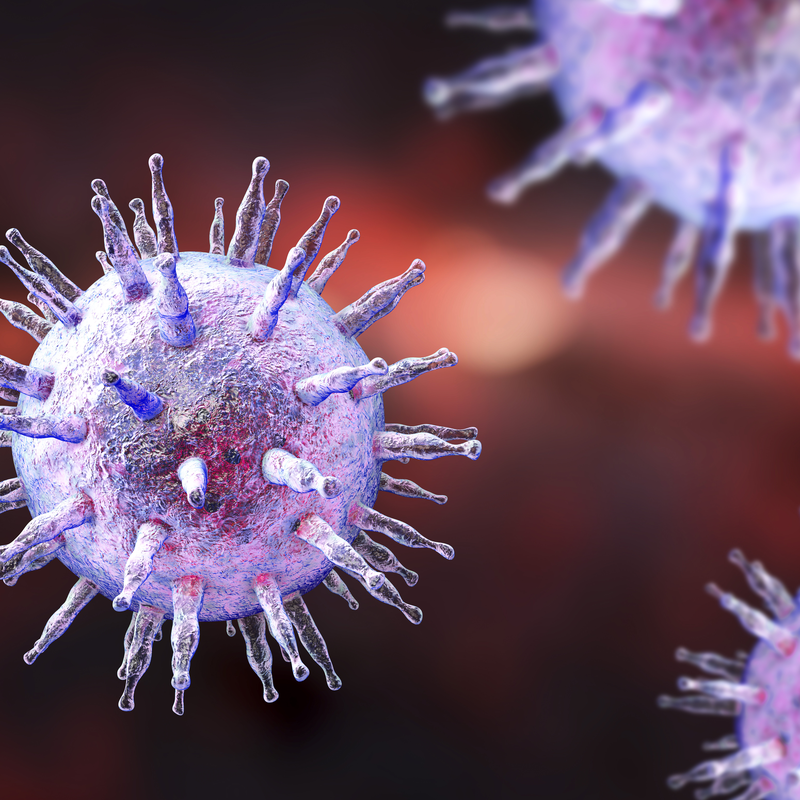
What is the Epstein-Barr virus?
The Epstein-Barr virus, belongs to the herpes virus family and is the virus that causes the so-called Pfeiffersche Drüsenfieber. This is a disease that pretty much everyone contracts once in their life. Since it is most often transmitted through kissing, it is also called the kissing disease.
How is the Epstein-Barr virus transmitted?
The virus is mostly transmitted through body fluids and since it is found mainly in saliva, people mainly get infected through very close body contact, for example, when kissing. Small children in kindergarten are particularly likely to become infected because toys are often put in their mouths there and then passed on to each other. But adults, especially the younger, "kissing-active" generation, are also frequently infected. About 95 % of people over 30 are infected with the virus. Not as often is the virus transmitted via a blood transfusion, organ donation or also via sexual intercourse . These transmission routes are rarer, but still possible.
What is the incubation period of the Epstein-Barr virus?
The period between infection and the onset of symptoms is very long in the case of glandular fever. Most cases have an incubation period of four to six weeks. But it is also quite possible for three months to pass. Without even knowing that you are ill, you already infect other people with the virus.
How long is the Epstein-Barr virus considered contagious?
A person who has just been infected with the virus quickly passes it on to others, because in this phase the person affected excretes many virus particles in their saliva. This is still the case for a long time, after the symptoms have subsided. For this reason, it is essential to wait until the first few months after infection before kissing and also to avoid unprotected sexual intercourse . This is the best way to prevent other people from contracting the virus.
Once a person has been infected with the Epstein-Barr virus, they remain a carrier of this virus for their entire life. However, in most cases, the body's immune system keeps this pathogen in check to such an extent that a new outbreak of glandular fever is rare. However, the virus is increasingly released again via saliva over time. That is why everyone who carries the virus is infectious to others at times.
What are the symptoms of Epstein-Barr virus?
The main symptoms of Epstein-Barr virus are tonsillitis and pharyngitis with swollen lymph nodes. But also, sometimes, high fever and exhaustion can be signs of an infection with the virus. In children, the infection with the Epstein-Barr virus is mostly asymptomatic, because the immune system of the little ones does not yet react so strongly to the pathogen. Adults usually suffer from a course of the disease with mild symptoms that resemble a flu-like infection. However, severe courses with complications can also be observed.
The following symptoms occur most frequently:
- Sore throat: Sore throat is typical for an infection with the virus. A particularly intense reddening of the throat and difficulty swallowing also indicate glandular fever. The lymph nodes in the throat and the tonsils swell enormously and some affected people suffer from fever. Under circumstances, a foul mouth odour can also be a symptom.
- Pronounced faintness: In the acute phase of Pfeiffer's glandular fever, patients feel very weak and weary. But most recover within a week or two. In other patients , however, the listlessness, fatigue and feeling of sickness persist for a much longer time, even if no characteristic symptoms have appeared.
- Swollen spleen: The spleen also plays an important role in the defence against disease. During acute infection with the virus, the spleen also has to do more work. For this reason, it swells and can even rupture under circumstances.
How is the Epstein-Barr virus diagnosed?
Diagnosing an infection with the Epstein-Barr virus often turns out to be difficult. The main symptoms, such as fever, lymph node swelling and sore throat, are also experienced by people with a flu-like infection. This is why glandular fever is often not recognised at all or only very late. Targeted testing for an infection with the Epstein-Barr virus only comes into play when the fever does not go down and a person feels down for weeks and shows strong signs of inflammation in the throat. With a throat swab that is examined in the laboratory, the diagnosis can be made without a doubt . However, since this positive result can also be obtained in a person who has been carrying the virus for a long time, for example after an infection, the Epstein-Barr virus must be detected by an antibody test in the blood .
How is the Epstein-Barr virus treated?
The treatment of mononucleosis focuses on reducing the symptoms and discomfort. For this purpose, analgesics and antipyretics are used to relieve pain and fever. Another important measure is physical rest, because this can significantly reduce severe complications. If, despite everything, complications occur, further treatment measures may be necessary .
The following points should be observed in the case of an infection with the Epstein-Barr virus:
- do not exercise or do any sports,
- drink enough fluids if you have a fever,
- take antipyretics after consulting your doctor,
- fatty foods and alcohol should be avoided,
How can the Epstein-Barr virus be prevented?
The virus is transmitted and spread via droplet infection. You can easily prevent an infection by avoiding contact with an acutely ill person and avoiding physical contact, for example also kissing. There is currently no vaccination against the Epstein-Barr virus .
